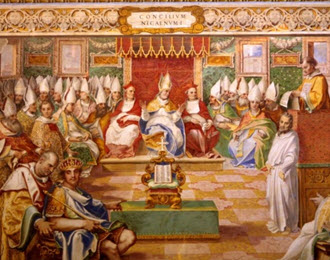Nicaea’s Capitulation to “Words of Human Wisdom”
10-07-2025 - Posted by Geert-JanJuly 19, 2021 – Posted by André Piet
In the Dutch daily newspaper Nederlands Dagblad of July 17, an article appeared about the Council of Nicaea in 325 AD, nearly 1,700 years ago. During this famous church council, convened by Emperor Constantine, the doctrine of Athanasius was declared the official teaching of the church, and the teaching of Arius was condemned. Athanasius opposed Arius because the latter denied that Jesus Christ was “God the Son.” Arius simply wanted to hold fast to the biblical wording that Jesus Christ is “the Son of God.” The term “God the Son” is not found in Scripture, he argued. But Scripture does say things like: “For us there is one God, the Father” (1 Cor. 8:6), or how Jesus Christ himself addressed his Father as “the only true God” (John 17:3).
But what makes the Nederlands Dagblad article remarkable is not the discussion of what happened at Nicaea. What stands out is the analysis in which it is acknowledged that Nicaea marked a break from biblical wording. In principle, the council chose philosophical terminology. I quote (bold and capital letters are mine – Andre Piet):
Apart from the complex theological question of how to understand the relationship between Christ and God the Father, there was another, very fundamental issue. For a significant number of bishops, the insertion of Greek philosophical terms into the Nicene Creed – which would be revised and expanded in 381 by the Council of Constantinople – was an abomination. According to Athanasius, the council fathers HAD IN VAIN SOUGHT A BIBLICAL EXPRESSION to articulate the divinity of the Son.
Indeed, Nicaea was about “the question of how to understand the relationship between Christ and God the Father.” But what is utterly staggering is that this biblical question was supposedly resolved by using “Greek philosophical terms”! Because they “had in vain sought a biblical expression to articulate the divinity of the Son,” they chose “words of human wisdom” (1 Cor. 2:13). And thus, terminology such as:
- “Trinity”
- “God the Son”
- “one essence – three persons”
- “one person – two natures”
etc.,
came to be elevated as normative standards for Christian language. These are terms and concepts demonstrably unknown to Scripture, yet they are nonetheless treated as the criterion for “orthodox doctrine.”
The ND article concludes:
… in the fourth century, it was also about the question of how the biblical message could find new words (…). May one add new, non-biblical words to Christian language? ‘Nicaea’ thought so. The church of all ages has followed suit.
Nicaea deliberately distanced itself from “the sound words” (2 Tim. 1:13) of Scripture. And (as the ND rightly observes): “the church of all ages has followed suit.” This observation has been repeatedly made on GoedBericht.nl and is by no means a new conclusion. But now it is also stated in black and white, confirmed by an orthodox Christian newspaper. Let that be noted!

 English Blog
English Blog